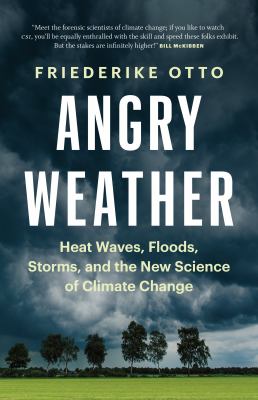Lavinia reviewed Angry Weather by Friederike Otto
Review of 'Angry Weather' on 'Goodreads'
5 stars
There is evidence that climate change is causing more frequent and severe weather events, but it is still difficult to determine if these two storms or any other extreme weather event is directly caused by climate change. Understanding the link between climate change and these events is crucial for developing effective strategies to mitigate their impacts. One scientist at the forefront of this research is Friederike Otto, whose work in attribution science has shed light on the extent to which human-induced climate change contributes to extreme weather events, such as heatwaves, droughts, and floods.
In Angry Weather, Otto introduces attribution science, a field of study that aims to assess the extent to which human-caused climate change contributes to extreme weather events. Using statistical methods and computer models, scientists compare observed climate data with global climate simulations that include and exclude human influence.
In the book, Otto argues that attribution science …
There is evidence that climate change is causing more frequent and severe weather events, but it is still difficult to determine if these two storms or any other extreme weather event is directly caused by climate change. Understanding the link between climate change and these events is crucial for developing effective strategies to mitigate their impacts. One scientist at the forefront of this research is Friederike Otto, whose work in attribution science has shed light on the extent to which human-induced climate change contributes to extreme weather events, such as heatwaves, droughts, and floods.
In Angry Weather, Otto introduces attribution science, a field of study that aims to assess the extent to which human-caused climate change contributes to extreme weather events. Using statistical methods and computer models, scientists compare observed climate data with global climate simulations that include and exclude human influence.
In the book, Otto argues that attribution science can help us understand the role of climate change in extreme weather events and develop strategies to mitigate their impacts in the future. She discusses several significant weather disasters that have occurred in recent years. Some of the most notable ones are Hurricane Harvey, which hit Texas in 2017 and caused widespread flooding and damage, and the European heatwave of 2019, which broke temperature records across the continent and caused numerous deaths. These weather disasters are just a few examples of the many extreme weather events that have occurred in recent years and are consistent with the predictions of climate change models.
Attribution science plays a vital role in our response to climate change. By understanding the extent to which human-induced climate change affects specific extreme weather events, governments can formulate effective climate policies. This knowledge also helps in the development of climate-resilient infrastructure and planning for climate adaptation. When policymakers are aware of the increased likelihood of specific extreme weather events due to climate change, they can take proactive measures to reduce vulnerability and strengthen resilience within communities.
Attribution science has significant legal and financial implications. Establishing liability for climate-related damages and providing evidence for causal claims can be crucial in holding major greenhouse gas emitters accountable. If specific weather events can be linked to human-induced climate change, it could lead to increased litigation against those responsible. This aspect of attribution science serves as a powerful tool for seeking justice and driving change.
Attribution science is still a young field, and scientists are still trying to improve and standardize the methods that they use to conduct attribution studies. However, through ongoing research and advancements in technology, it is rapidly evolving. The attention it receives in the media raises public awareness of the impacts of climate change on extreme weather events, ultimately garnering greater support for actions to mitigate climate change.
Angry Weather is a well-researched and accessible book that provides a comprehensive overview of attribution science and its role in understanding climate change. It is timely and relevant, given the increasing frequency of extreme weather events around the world, and it highlights the urgency of addressing climate change and the need for immediate action.

